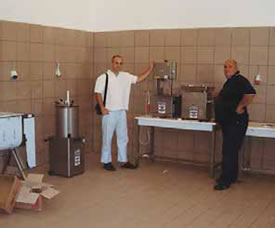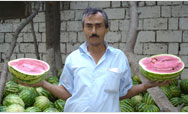 |
|
 |
 |
 |
USAID Information:
External Links:
|
|
 |
 |
|
 |
 |
|
Villagers Rejuvenate Local Food Production in Southwestern Montenegro
The Montenegrin region of Katunska Nahija, with the villages Cevo, Njegusi, and Tresnjevo, is well-known for its traditional production of ham, dried meat, and cheese. Villagers from the
region used to provide meat-drying services for the state-owned Trgopromet and Montena companies, but during the '90s demand dropped and organized sales ceased. This resulted in a drastic decrease in villagers' incomes, while the lack of new local investment hindered the villagers from improving their meat-drying facilities to remain competitive in larger markets.
In the village of Cevo, this vicious cycle brought the industry to the brink of extinction.
Inspections began to reveal substandard technical and hygienic conditions that threatened to close all drying facilities in the area-closings that would leave 21 families without any income.
 |
| USAID, local residents, and the Cetinje municipality partnered to restore
local economic opportunity by renovating this meat-production facility |
These 21 families reacted by forming the Association of Traditional Meat Producers
and formulating a plan to renovate and share a central processing facility for their
products. The association applied for assistance from USAID's Community Revitalization through Democratic Action (CRDA) program, which pledged more than $41,000 to the association's efforts through International Relief and Development (IRD). The association's members contributed more than $23,000 in cash and in-kind contributions, while the Cetinje
municipality offered a physical location.
The association's facility provides a central, sanitary facility for processing, smoking, and packaging meat. In addition, association members began upgrading their own premises used for drying meats, in anticipation of obtaining the permits necessary to restart dried-meat production. The association's efforts resulted in several positive results, one of which was a supply agreement between members and the Carine supermarket chain. This means a great deal to people like Miodrag Nikolic, who turned to the traditional work of producing milk and dried meat after loosing his job in a local factory. These were the only sources of income for his eight family members, all of whom share one household.
Nikolic completed the necessary upgrades and obtained the permit to use his drying facility which can produce 4,000 pieces of meat annually. He expects to earn approximately $12,000 annually from supplying the supermarket and plans to double his meat-drying capacity in the future.
"This project is the best thing that could happen to us," said Nikolic of the association's work with the American people through USAID. "This is the basis for our future prosperity."
Back to Top ^ |


